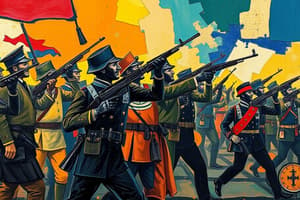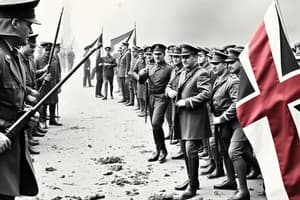Podcast
Questions and Answers
What significant social change occurred for women during the early 20th century?
What significant social change occurred for women during the early 20th century?
- Gained rights to education
- Gained increased representation in the workforce
- Became primary breadwinners
- Lost their place in the workforce (correct)
Which leader was primarily associated with the Bolshevik Revolution in Russia?
Which leader was primarily associated with the Bolshevik Revolution in Russia?
- Tsar Nicholas II
- Leon Trotsky
- Joseph Stalin
- Vladimir Lenin (correct)
What was a significant impact of militarism prior to World War I?
What was a significant impact of militarism prior to World War I?
- Decreased size of armies
- Glorification of war and military (correct)
- Decline in national pride
- Increased influence of diplomats
What was one key result of the Mexican Revolution?
What was one key result of the Mexican Revolution?
Which of the following alliances included Germany?
Which of the following alliances included Germany?
Stalin's policy of 'socialism in one country' primarily aimed at what?
Stalin's policy of 'socialism in one country' primarily aimed at what?
Which event directly contributed to the start of World War I?
Which event directly contributed to the start of World War I?
What was the purpose of the Schlieffen Plan for Germany?
What was the purpose of the Schlieffen Plan for Germany?
Which of the following was a cause of the Great Depression?
Which of the following was a cause of the Great Depression?
Which event marked the abdication of the Tsar in Russia?
Which event marked the abdication of the Tsar in Russia?
How did imperialism contribute to tensions leading up to World War I?
How did imperialism contribute to tensions leading up to World War I?
What was one impact of the New Deal in the United States?
What was one impact of the New Deal in the United States?
What was the main result of the Treaty of Versailles on Germany?
What was the main result of the Treaty of Versailles on Germany?
What was the outcome of the May Fourth Movement in China?
What was the outcome of the May Fourth Movement in China?
Which technological advancement had a notable impact on warfare during World War I?
Which technological advancement had a notable impact on warfare during World War I?
What economic effect did the entry of the U.S. into World War I have?
What economic effect did the entry of the U.S. into World War I have?
What was a significant change in Hitler's tactics during the London Blitz?
What was a significant change in Hitler's tactics during the London Blitz?
What was the primary outcome of the Battle of Midway for the Allied forces?
What was the primary outcome of the Battle of Midway for the Allied forces?
What event marked the U.S. entry into World War II?
What event marked the U.S. entry into World War II?
Which of the following best describes the situation in Europe by April 1945?
Which of the following best describes the situation in Europe by April 1945?
What was a significant factor that delayed the Allied victory in Italy until June 1944?
What was a significant factor that delayed the Allied victory in Italy until June 1944?
What ideological belief fueled Hitler's actions during the Holocaust?
What ideological belief fueled Hitler's actions during the Holocaust?
What was one of Stalin's major concerns following the war?
What was one of Stalin's major concerns following the war?
Which of the following best explains the impact of war on the Soviet home front?
Which of the following best explains the impact of war on the Soviet home front?
What was a key factor that contributed to Hitler's rise to power in Germany?
What was a key factor that contributed to Hitler's rise to power in Germany?
Which of the following best describes the nature of the Soviet regime under Stalin?
Which of the following best describes the nature of the Soviet regime under Stalin?
What was a major outcome of the Treaty of Versailles as it pertained to Germany?
What was a major outcome of the Treaty of Versailles as it pertained to Germany?
Which event was the catalyst for Japanese expansion into Manchuria?
Which event was the catalyst for Japanese expansion into Manchuria?
Which Eastern European country was influenced by fascism and had a totalitarian regime similar to that of Italy?
Which Eastern European country was influenced by fascism and had a totalitarian regime similar to that of Italy?
What was a consequence of the Great Depression on the Soviet Union?
What was a consequence of the Great Depression on the Soviet Union?
How did the response of Great Britain to Hitler's actions in Europe contribute to the outbreak of WWII?
How did the response of Great Britain to Hitler's actions in Europe contribute to the outbreak of WWII?
What was one of the military strategies used by the Japanese during their expansionist policies in Asia?
What was one of the military strategies used by the Japanese during their expansionist policies in Asia?
Flashcards
Militarism
Militarism
The glorification of war and the military, leading to increased army size, influence of military leaders, and widespread conscription.
Triple Entente
Triple Entente
An alliance between Russia, France, and Great Britain formed before World War I.
Imperialism
Imperialism
Powerful nations taking control of weaker countries for economic, political, or social reasons.
Nationalism
Nationalism
Signup and view all the flashcards
Schlieffen Plan
Schlieffen Plan
Signup and view all the flashcards
Total War
Total War
Signup and view all the flashcards
Treaty of Versailles
Treaty of Versailles
Signup and view all the flashcards
What were the main causes of World War I?
What were the main causes of World War I?
Signup and view all the flashcards
Post-Revolution Mexico
Post-Revolution Mexico
Signup and view all the flashcards
Rise of Fascism
Rise of Fascism
Signup and view all the flashcards
Soviet Union
Soviet Union
Signup and view all the flashcards
Stalin's Control
Stalin's Control
Signup and view all the flashcards
May 4th Movement
May 4th Movement
Signup and view all the flashcards
Great Depression's Causes
Great Depression's Causes
Signup and view all the flashcards
Stalin's Industrial Society
Stalin's Industrial Society
Signup and view all the flashcards
New Deal
New Deal
Signup and view all the flashcards
Hitler's Invasion of Poland (1939)
Hitler's Invasion of Poland (1939)
Signup and view all the flashcards
Luftwaffe
Luftwaffe
Signup and view all the flashcards
Russian Front
Russian Front
Signup and view all the flashcards
Pearl Harbor (December 7, 1941)
Pearl Harbor (December 7, 1941)
Signup and view all the flashcards
Island Hopping
Island Hopping
Signup and view all the flashcards
Holocaust
Holocaust
Signup and view all the flashcards
Atomic Bomb
Atomic Bomb
Signup and view all the flashcards
Soviet Union's Losses
Soviet Union's Losses
Signup and view all the flashcards
Hitler's Rise to Power
Hitler's Rise to Power
Signup and view all the flashcards
Appeasement
Appeasement
Signup and view all the flashcards
Stalinism
Stalinism
Signup and view all the flashcards
Collectivization
Collectivization
Signup and view all the flashcards
Totalitarian State
Totalitarian State
Signup and view all the flashcards
Expansionist Japan
Expansionist Japan
Signup and view all the flashcards
Mukden Incident
Mukden Incident
Signup and view all the flashcards
Study Notes
World War I: The Road to War
- Militarism characterized by the glorification of war and the military, including the increased size of armies and the increased influence of military leaders. Conscription was also a common practice.
- Alliances were formed between nations, including the Triple Entente (Russia, France, and Great Britain) and the Triple Alliance (Germany, Austria-Hungary, and Italy), creating complex interconnected relationships leading to the escalation of conflict.
- Imperialism, the stronger nations controlling weaker ones, led to political and economic tension, resulting in competition between countries. Nationalism, the strong pride in one's country, further exacerbated these tensions.
- Increasing nationalism and competition among nations, resulting in intensified rivalries and imperialist expansion.
- Competition between countries heightened due to global competition for raw materials and new markets.
World War I: Causes and Events
- Growing Militarism created tension because of the aggressive nature of Germany and the Franco-Prussian War, leading to the loss of Alsace-Lorraine by France.
- Balkan unrest and Austria annexing Bosnia led to dissatisfaction with the Serbian desire for a united Balkan state.
- The assassination of Archduke Francis Ferdinand, the heir to the Austro-Hungarian throne, triggered a series of events that escalated into war.
- The Schlieffen Plan, Germany's plan for a two-front war against France and Russia, further intensified the conflict.
Characteristics of World War I
- New wartime weaponry, such as barbed wire, poison gas, airplanes, and submarines, significantly altered the nature of warfare, leading to early stalemates on the Western Front.
- Governments took control of their countries' economies, known as total war, to support the war effort.
- The role of women in the workforce expanded during the war.
U.S. Entry into World War I
- American involvement began with Germany's unrestricted submarine warfare and the sinking of the Lusitania in 1915.
- The U.S. entered the war in April 1917.
- American economic contributions significantly aided the Allied war effort.
Treaty of Versailles and its Consequences
- The Treaty of Versailles, the peace treaty imposed on Germany, blamed Germany for starting the war.
- Harsh terms, including reparations and a reduced army, were imposed on Germany.
- Germany's dissatisfaction and unresolved issues contributed to the instability of the post-war era.
- Eliminating the German air force was one of the key terms.
- Returning Alsace-Lorraine to France was also a condition of the treaty.
World War II
- Authoritarian regimes emerged in various countries, impacting international relations.
- The rise of fascism in Italy, under Benito Mussolini, initiated totalitarian governments and elimination of political opponents, setting the stage for future conflicts.
- Political conflicts arose from the Treaty of Versailles.
Post-War World
- The global order changed drastically due to WWI and the rise of totalitarian regimes which influenced international relations and fostered strong nationalistic sentiments in various parts of the world after WWI.
World War II
- Increased global tension and aggression following WWI and instability in the post war world.
Post-World War II Outcomes
- The war resulted in significant losses of life and resources, impacting economies worldwide.
- The establishment of the United Nations aimed to prevent future conflicts, though its success has been limited.
Studying That Suits You
Use AI to generate personalized quizzes and flashcards to suit your learning preferences.




